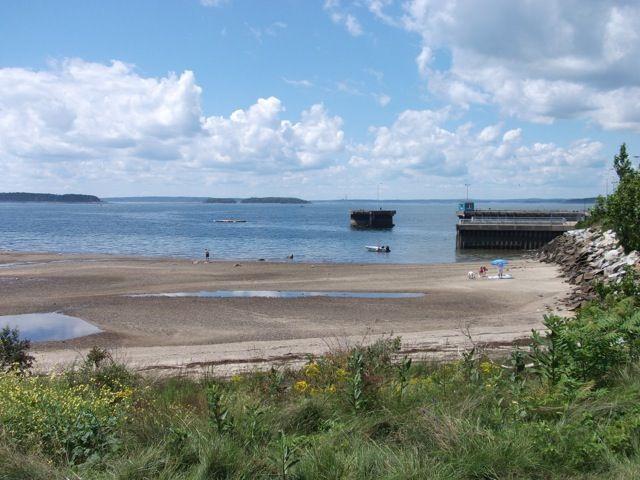HARPSWELL — The town and Harpswell Coastal Academy have agreed – although informally – to move forward on the charter school’s proposed “Propeller Project” at Mitchell Field.
At a workshop Monday afternoon, representatives from HCA sat down with selectmen and town staff to flesh out the details of a project first pitched by the school to the town last month.
The plan, as it stands now, is to build a “coastal center for thinkers and doers” on the site of the former U.S. Navy Fuel Depot.
HCA Head of School John D’Anieri says the Landing School in Arundel, the University of New England, and Portland-based ReVision Energy have all expressed a desire to help develop the auxiliary campus.
“This should feel more like a research campus than a business district,” D’Anieri told selectmen Monday.
The Landing School is interested in expanding to a Harpswell campus, teaching boat building at a proposed “Harpswell MarineWorks,” according to a project overview. UNE has proposed building a “Center for Ocean-Based Food Systems” to develop aquaponics, aquaculture, horticulture, and a marine business incubator.
The centerpiece, D’Anieri has said, is a “Coastal Commons” in the old Navy administration building. The renovated space would hold the Harpswell Neck Library, a cafe, and community theater space, he said.
Selectman Elinor Multer asked D’Anieri about the level of commitment from outside organizations. He responded that the agreements have been made on a “handshake level … but a strong handshake.”
“Moving to a written agreement would be relatively easy,” he said. “People are eager and excited.”
D’Anieri explained that HCA is looking to incorporate the Propeller Project as a separate nonprofit, with its own board of directors.
This would allow it to lease property from the town, and then sub-lease to individual entities like UNE, or future business start-ups.
But the town needs to do some lifting before any of this could happen. There is an estimated $400,000 of infrastructure improvements that need to be made to things like the roads and sewer at Mitchell Field.
D’Anieri believes state and federal grants could be acquired to pay for much of the work. But having the town on board would give HCA a lot of leverage in securing such grants, he argued.
“We have to raise the money with the insurance that there’s a likelihood this project will go, and that it’s not just speculative,” he said.
“In a sense, you’re asking for an option,” said Town Planner Mark Eyerman.
Multer was wary about signing any formal agreements before costs could be more concretely projected.
“What is this going to do to the taxpayers,” she asked. “That’s a totally open question.”
Selectman Kevin Johnson was more supportive. “Nothing’s been done (on Mitchell Field) for two decades,” he said. “This is a great project … these are all heavy hitters.”
Rick Daniel, chairman of the board of selectmen, was also in favor of entering a collaborative early stage of the project. “The lines of communication are open,” he said.
Selectmen agreed to meet and discuss the project in the next couple weeks, before bringing a more formal agreement proposal back to a joint workshop in the future.
After the meeting, D’Anieri said he was pleased with what he thought was a “very positive conversation.”
He said he believes the project, if it comes to fruition, has “replicability” around Maine.
Other schools or institutions, he said, could look at under-utilized assets in their areas and use the Propeller Project model to revitalize space for education and business.
“We have this idea (at HCA), ‘student as worker,'” D’Anieri said. “If we’re going to deliver, we need places for students to actually work.”
Walter Wuthmann can be reached at 781-3661 ext. 100 or wwuthmann@theforecaster.net. Follow Walter on Twitter: @wwuthmann.

Comments are no longer available on this story